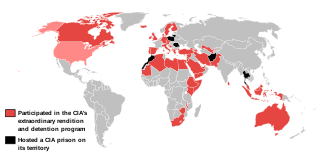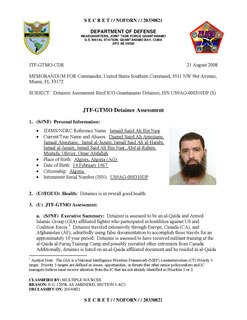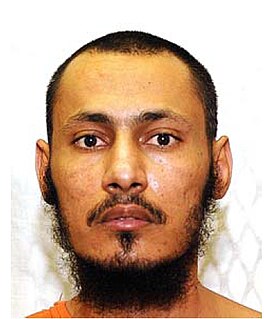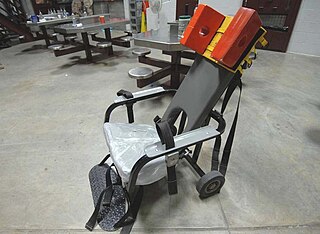Related Research Articles
Muhammad Ismail Agha is an Afghan national who was among some 15-21 juveniles held at the Guantanamo Bay detention camps. He is believed to be 13 or 14 years old when arrested by Afghan soldiers. Detained without charge, he was released on January 29, 2004, and returned home.

Geoffrey D. Miller is a retired United States Army Major General who commanded the US detention facilities at Guantanamo Bay, Cuba, and Iraq. Detention facilities in Iraq under his command included Abu Ghraib prison, Camp Cropper, and Camp Bucca. He is noted for having trained soldiers in using torture, or "enhanced interrogation techniques" in US euphemism, and for carrying out the "First Special Interrogation Plan," signed by the Secretary of Defense, against a Guantanamo detainee.

Camp Iguana is a small compound in the detention camp complex on the US Naval base at Guantánamo Bay, Cuba. Camp Iguana originally held three child detainees, who camp spokesmen then claimed were the only detainees under age 16. It was closed in the winter of 2004 when the three were sent back to their native countries.

Colonel Michael Bumgarner has been a career officer in the military police of the United States Army. He is most noted for having been the commander of the Joint Detention Group, the guard force component of Joint Task Force Guantanamo, from April 2005 through June 2006, at the Guantanamo Bay detention camp. During this period there was a widespread hunger strike in 2005, which he helped end. On June 10, 2006, three detainees were found dead, in what the United States Department of Defense announced as suicides. Bumgarner had other assignments after Guantanamo and retired from the military in 2010.
Extrajudicial prisoners of the United States, in the context of the early twenty-first century War on Terrorism, refers to foreign nationals the United States detains outside of the legal process required within United States legal jurisdiction. In this context, the U.S. government is maintaining torture centers, called black sites, operated by both known and secret intelligence agencies. Such black sites were later confirmed by reports from journalists, investigations, and from men who had been imprisoned and tortured there, and later released after being tortured until the CIA was comfortable they had done nothing wrong, and had nothing to hide.

In military terminology, a black site is a location at which an unacknowledged black operation or black project is conducted. It can refer to the facilities that are controlled by the CIA and used by the U.S. government in its War on Terror to detain alleged unlawful enemy combatants.

Djamel Saiid Ali Ameziane is an Algerian citizen, and former resident of Canada, who was held in extrajudicial detention in the United States Guantanamo Bay detention camps, in Cuba.
The Guantanamo Bay detention camp is a United States military prison located within Guantanamo Bay Naval Base, also referred to as Guantánamo, GTMO, and "Gitmo", which is on the coast of Guantánamo Bay in Cuba.
The Tipton Three is the collective name given to three British citizens from Tipton, England who were held in extrajudicial detention by the United States government for two years in Guantanamo Bay detainment camp in Cuba.

Mohammed Ali Abdullah Bwazir is a citizen of Yemen, once held in extrajudicial detention in the United States Guantanamo Bay detainment camps, in Cuba. Bwazir's Guantanamo Internment Serial Number was 440. American intelligence analysts estimate he was born in 1980, in Howra, Yemen.
The United States Department of Defense (DOD) had stopped reporting Guantanamo suicide attempts in 2002. In mid-2002 the DoD changed the way they classified suicide attempts, and enumerated them under other acts of "self-injurious behavior".
Yasser Talal al Zahrani was a citizen of Saudi Arabia who was held in extrajudicial detention in the United States Guantanamo Bay detainment camps, in Cuba. His Guantanamo Internment Serial Number was 93. The Department of Defense (DoD) reported that he was born on September 22, 1984, in Saudi Arabia. At the time of his capture, al-Zahrani was initially suspected of being "a front line fighter for the Taliban", though he was later considered "second line". He was also suspected of arranging weapons purchases.

Al Hajj Abdu Ali Sharqawi is a Yemeni alleged Al-Qaeda associate who is currently being held in the United States's Guantanamo Bay detention camps, in Cuba.
White torture, often referred to as “white room torture,” is a type of psychological torture technique aimed at complete sensory deprivation and isolation. A prisoner is held in a cell that deprives them of all senses and identity. It is particularly used in Iran; however, there is also evidence of its use in the United States, Venezuela, Ireland and other parts of Europe.
The nature of international human rights law has been seemingly altered by Americans since the attacks on New York City and Washington, D.C. on September 11, 2001. The Guantanamo Bay detention camp is one example of recent developments that seem to disregard long standing human rights. The United States of America (USA) has pursued a 'seemingly deliberate strategy' to put suspected terrorists outside the reach of habeas corpus protections. Naval Station Guantanamo Bay serves as the location for a United States military prison in Cuba designed for the detention of non-citizens suspected of terrorist activity. At the time of its creation President Bush stated that its purpose was to respond to serious war crimes, primarily 'a new way to deal with terrorists'. The first camp was set up 3 months after the attacks on the twin towers and since then a human rights debate has begun over the legality of denying detainees the right to petition habeas corpus.
Sondra Crosby is an American medical doctor and Professor of Medicine at Boston University, specializing in internal medicine. She is also a faculty member of the Health Law, Bioethics and Human Rights department at the Boston University School of Public Health.

The Guantanamo Bay Hunger Strikes were a series of prisoner protests at the Guantanamo Bay detention camp. The first hunger strikes began in 2002, when the camp first opened, but the secrecy of the camp's operations prevented news of those strikes from reaching the public. The first widely reported hunger strikes occurred in 2005.
References
- ↑ "Theater of pain - News - Local Stories - November 19, 2009". Sacramento News & Review. Retrieved July 16, 2020.
- ↑ "The Lingering Effects of Torture". ABC News. Retrieved July 16, 2020.
- ↑ "US acknowledges it held 12 juveniles at Guantanamo — The Center for the Study of Human Rights in the Americas (CSHRA)". humanrights.ucdavis.edu. Retrieved July 16, 2020.
- ↑ "More youth at Guantánamo than U.S. claimed". UC Davis. June 7, 2011. Retrieved July 16, 2020.
- ↑ McSherry, J. Patrice (June 22, 2010). "Review of the Trauma of Psychological Torture". Social Justice. 37 (2–3): 149. ISSN 1043-1578.